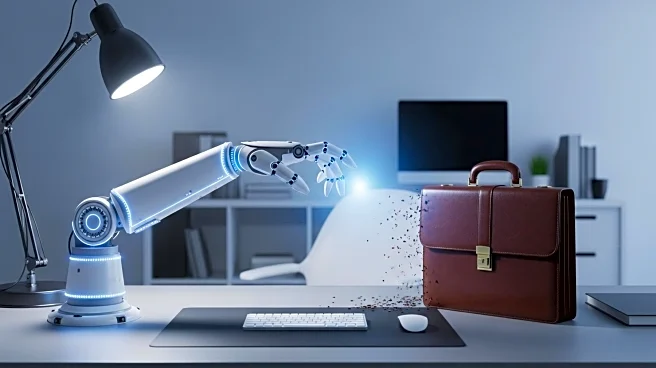What's Happening?
Salesforce CEO Marc Benioff revealed during a Labor Day podcast that the company has reduced its customer support workforce by 4,000 roles following the deployment of AI agents. This reduction is part of a broader trend where AI is reshaping the workforce, particularly in roles that involve direct customer interaction. While Salesforce's move is significant, it may not be indicative of a widespread trend, as many companies plan to retain human agents alongside AI. The impact of AI on employment is further highlighted by a Stanford study showing a 20% drop in employment for young software engineers, while older engineers see increased hiring. Additionally, a study from the Gerald Huff Fund for Humanity warns that AI could put 45 million U.S. jobs at risk by 2028, advocating for Universal Basic Income as a potential solution.
Why It's Important?
The integration of AI into the workforce is causing significant shifts in employment patterns, particularly in sectors like customer service and software engineering. While AI offers efficiency and cost savings, it also poses challenges for job security, especially for entry-level positions. The potential displacement of millions of jobs could have profound implications for economic mobility and workforce stability. Companies and policymakers may need to consider strategies to mitigate the impact, such as retraining programs or financial safety nets like Universal Basic Income. The broader adoption of AI could redefine job roles and necessitate a reevaluation of workforce planning and development.
What's Next?
As AI continues to evolve, companies may increasingly rely on AI-driven solutions, potentially leading to further workforce reductions. The trend could prompt discussions among policymakers and industry leaders about balancing technological advancement with employment stability. Companies might explore hybrid models that integrate AI with human oversight to maintain customer satisfaction. Additionally, the potential for AI to disrupt various industries may lead to increased advocacy for regulatory measures and support systems to protect affected workers.
Beyond the Headlines
The ethical implications of AI-driven workforce changes are significant, raising questions about the responsibility of companies to their employees. The potential 'hollowing out' of entry-level jobs could exacerbate social inequalities and limit career advancement opportunities for younger workers. The debate over AI's role in the workforce may also influence public policy discussions on labor rights and economic equity.









